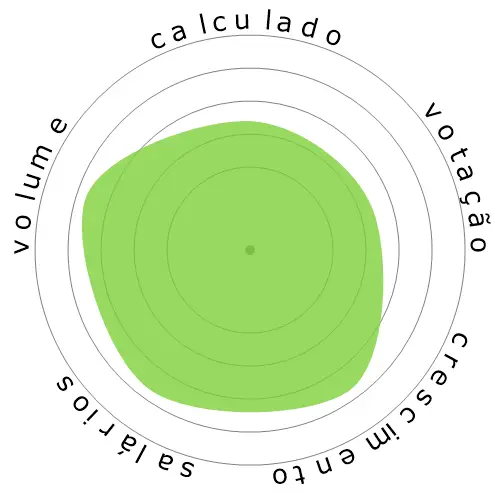Conselheiros Financeiros Pessoais




As pessoas também visualizaram
Risco de automação calculado
Risco Moderado (41-60%): Ocupações com risco moderado de automação geralmente envolvem tarefas rotineiras, mas ainda requerem algum julgamento e interação humanos.
Mais informações sobre o que é essa pontuação e como ela é calculada estão disponíveis aqui.
Enquete do usuário
Nossos visitantes votaram que estão incertos se esta ocupação será automatizada. Esta avaliação é ainda mais apoiada pelo nível de risco de automação calculado, que estima 43% de chance de automação.
O que você acha que é o risco da automação?
Qual é a probabilidade de que Conselheiros Financeiros Pessoais seja substituído por robôs ou inteligência artificial nos próximos 20 anos?
Sentimento
O gráfico a seguir é incluído sempre que há uma quantidade substancial de votos para gerar dados significativos. Essas representações visuais mostram os resultados das enquetes dos usuários ao longo do tempo, fornecendo uma indicação importante das tendências de sentimento.
Sentimento ao longo do tempo (anualmente)
Crescimento
Espera-se que o número de vagas de emprego para 'Personal Financial Advisors' aumente 17,1% até 2033
Emprego total e estimativa de vagas de emprego
As projeções atualizadas são devidas 09-2025.
Salários
Em 2023, o salário anual mediano para 'Personal Financial Advisors' foi de $ 99.580, ou $ 47 por hora
'Personal Financial Advisors' receberam 107,2% a mais do que o salário médio nacional, que era de $ 48.060
Salários ao longo do tempo
Volume
A partir de 2023 havia 272.190 pessoas empregadas como 'Personal Financial Advisors' dentro dos Estados Unidos.
Isso representa cerca de 0,18% da força de trabalho empregada em todo o país
Dito de outra maneira, cerca de 1 em 557 pessoas são empregadas como 'Personal Financial Advisors'.
Descrição do trabalho
Aconselhe clientes sobre planos financeiros usando conhecimento de estratégias de impostos e investimentos, seguros, planos de pensão e imóveis. As responsabilidades incluem avaliar os ativos, passivos, fluxo de caixa, cobertura de seguro, status fiscal e objetivos financeiros dos clientes. Também pode comprar e vender ativos financeiros para clientes.
SOC Code: 13-2052.00


Comentários
Leave a comment
How can one relate to a line of code, or trust that the programmers inherent biases are not skewing the results?
I’m completely on the fence when it comes to which jobs and when AI will replace the human workforce. I don’t underestimate the ambitions of tech producers and the average human being's preference for the quick, easy, and cheaper option to bring about such a situation. And let’s not forget how far technology has come since the Internet, let alone the simple calculator.
All this said we shouldn’t think that the scenario where AI could replace the human workforce is one that’s predetermined. “We” (everyone single one of us) have the collective ability to cause or prevent such an eventuality. We must also consider how viable an AI-dominated society and economy would really be. Every government across the globe would have its hands cut out with a population whose majority is unemployable. Imagine the civil unrest? Another consideration is the damage this could do to the economy; if a massive portion of humanity isn’t working, and isn’t getting a wage like they used to, we would see an unprecedented reduction in the flow of money around the economy. And what happens to money when there is a lack of exchange taking place? Doesn’t the value of money decrease? The financial advisors in this forum would be the best to elaborate on this or to correct my statement.
In conclusion: while I have no doubt that the ambitious tech lords and their acolytes will do what they can to bring about an AI world, the question of whether humans from governments to ordinary citizens will allow it is another thing altogether.
For example, look at what services SoFi offers on their brokerage it's revolutionary. When you first heard "stonks always go up brrrrr" then that was the exact point the financial advisors and other various staff felt the chill up their spine of oncoming obsolescence.
Like Librarians in 2004 though, if you have the job now you won't even consider retirement for 15 years you're good. Are Advisors being used by Millennials and Gen Zoomer? I really am beginning to doubt it highly, they will just put all their money in SPY, QQQ, SOXL, REITs and move on with their lives.
Robots didn't kill Advisors but technology did and the ETF.
Lot of emotional intelligence in planning.
AI will just make planners better.
The staff are unhelpful and untrained, cannot answer simple questions and it seems the solution to a problem is to call the call centre which I could do from home.
A physical visit to the bank is deliberately discouraged by management - it is not possible to find a manager in a bank.
Not much fun and clearly a strong incentive by the bank owners to discourage visits which will reduce the number of staff required. I do not see 'brick and mortar' banking surviving.
Most questions are dealt with through the call centre and I see this as the future. This can be fairly easily changed to a 'press 1 for...' system which once again removes the requirement for staff.
The service industries such as banking are ripe for automation. I think Digital Banking will change the requirement for a visit to the bank. What do you think?
All the best,
Mr. Planner.
Deixe uma resposta sobre esta ocupação